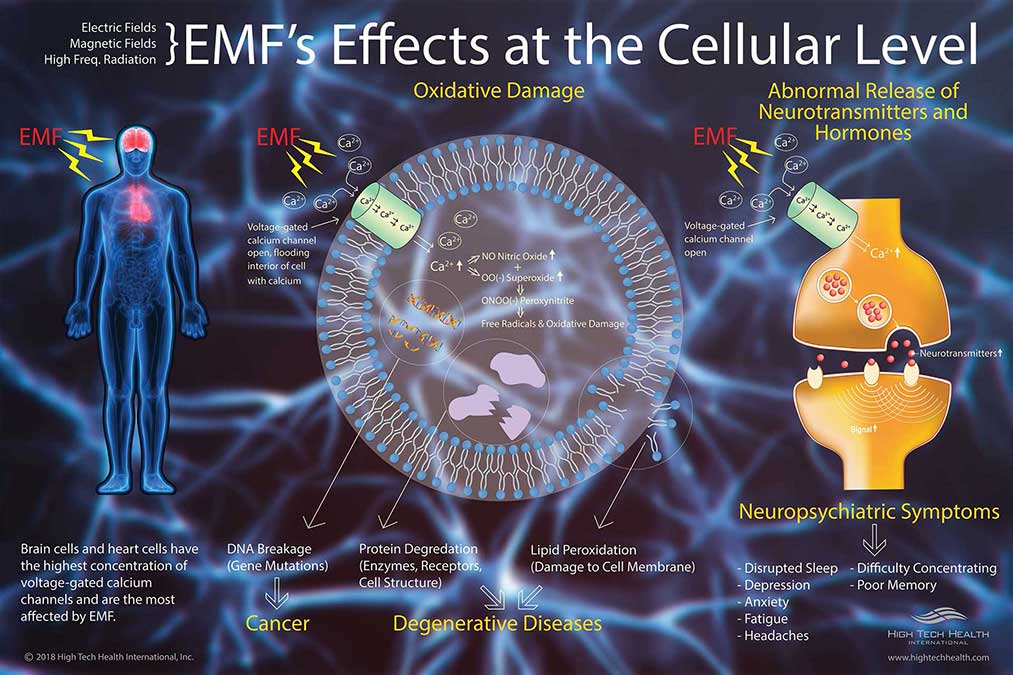EMF exposure is a well-known subject in the athletic world, especially for athletes who are mindful of optimizing performance, recovery, and overall health. But what about its influence on something as fundamental as hydration and electrolyte balance? While EMF might not seem like the obvious culprit for dehydration or electrolyte imbalance, it’s important to consider the body’s complex physiological responses to this ever-present source of modern-day stress.
Let’s dive into the nuances of how EMF could affect hydration and electrolyte levels, followed by actionable strategies for athletes to protect themselves through diet and lifestyle.
The Interplay Between EMF, Cellular Stress, and Hydration
Hydration in the body is not just about how much water you drink; it’s about how well your body retains and utilizes that water at a cellular level. One of the potential effects of EMF exposure is the increase in oxidative stress within cells, which can directly impact cellular function, including the cells’ ability to regulate water and electrolytes.
Water retention and electrolyte balance rely on efficient cell membranes and signaling systems to ensure that nutrients flow in and out of cells. When oxidative stress levels rise due to prolonged EMF exposure, cells may become less efficient at managing this exchange, potentially leading to a state where hydration becomes less optimal, despite adequate water intake.
Moreover, if cellular membranes become compromised, the transport of key electrolytes—such as sodium, potassium, and calcium—can be disrupted. This can result in an imbalance, leading to muscle cramps, fatigue, and even cognitive fog, especially during peak physical exertion.
Cellular Integrity and Water Retention
For athletes, proper hydration goes beyond quenching thirst—it’s about ensuring that water is properly absorbed and utilized in every part of the body. EMF-induced cellular stress can affect this process. Picture the cells as gatekeepers: when functioning optimally, they efficiently regulate the inflow and outflow of water and electrolytes. However, prolonged exposure to EMF may weaken these gatekeepers, leading to water loss, dehydration, and poor nutrient uptake.
Even minor dehydration can significantly impair athletic performance. Dehydration decreases blood volume, which reduces the efficiency of nutrient delivery and waste removal, negatively impacting endurance and strength.
Electrolytes: The Unsung Heroes in Athletic Performance
Electrolytes are minerals that play a critical role in many bodily functions, particularly in maintaining hydration, muscle function, and nerve signaling. The key players—sodium, potassium, magnesium, and calcium—work together to ensure proper muscle contraction, hydration balance, and even cognitive performance.
EMF may not cause an immediate, drastic drop in electrolyte levels, but its cumulative effects on cellular function and nervous system regulation may make it harder for the body to maintain proper electrolyte balance during times of high stress—like intense training or competition.
Sodium and Potassium: The Balance of Muscle and Nerve Function
Sodium and potassium, in particular, are crucial for muscle contraction and nerve impulse transmission. Athletes lose a significant amount of sodium and potassium through sweat during training. If EMF exposure amplifies oxidative stress and disrupts cell membrane function, this could make it more difficult for athletes to maintain the sodium-potassium balance that’s critical for muscle function and endurance.
An imbalance here can lead to muscle cramping, reduced stamina, and fatigue—all of which are a recipe for underperformance.
Calcium and Magnesium: Recovery and Relaxation
Calcium plays a pivotal role in muscle contraction, while magnesium ensures that muscles can relax afterward. The balance between calcium and magnesium is crucial for preventing muscle cramps and ensuring effective recovery. With EMF exposure potentially disrupting hormonal regulation (like cortisol) and interfering with how cells manage oxidative stress, athletes might find that they’re more prone to muscle tension, cramps, and sluggish recovery.
Mitigating the Effects of EMF on Hydration and Electrolyte Balance
Now that we’ve established how EMF might indirectly affect hydration and electrolyte levels, let’s look at practical ways athletes can protect themselves.
1. Prioritize Hydration With Electrolytes
It might sound obvious, but hydration requires more than just water. Athletes should focus on electrolyte-rich fluids that help restore the minerals lost through sweat and offset any oxidative stress caused by EMF exposure.
Natural options include coconut water, which is high in potassium, or homemade electrolyte drinks with a pinch of high-quality sea salt, magnesium powder, and fresh citrus juice. Supplementing with a high-quality electrolyte powder, free from artificial additives and sugars, can also be beneficial.
2. EMF and Nutrient-Rich Diets
A diet rich in antioxidants and anti-inflammatory foods is critical for athletes facing consistent EMF exposure. Here are some top dietary considerations:
Magnesium-Rich Foods: Magnesium is one of the first minerals depleted under stress (including EMF-induced stress). Incorporate magnesium-rich foods like leafy greens, avocados, nuts, seeds, and dark chocolate to support muscle relaxation and electrolyte balance.
Potassium-Packed Foods: Potassium helps regulate fluid balance and is crucial for preventing cramping. Foods like bananas, sweet potatoes, and spinach are excellent sources of potassium.
Calcium Sources: Strong bones and muscle contractions rely on calcium. Grass-fed dairy products, leafy greens, and fish such as sardines are great natural sources of calcium.
Sodium Balance: While sodium has a bad reputation, athletes who train intensively and sweat profusely need to maintain adequate sodium levels. Opt for natural sea salts or Himalayan pink salt to avoid the processed variety often found in pre-packaged foods.
Hydration-Boosting Fruits: Water-rich fruits like cucumbers, watermelon, and strawberries help hydrate the body while providing antioxidants that combat EMF-induced oxidative stress.
3. Supplement Wisely
Given the stress EMF can place on your system, the right supplementation can make all the difference:
Magnesium Supplements: A magnesium deficiency can exacerbate dehydration and electrolyte imbalances, especially under EMF exposure. Athletes should consider adding a high-quality magnesium supplement to their routine.

Save $10 on Electrolyte Supreme with code “kyletothemoon” Electrolyte Supplements: Look for clean, sugar-free electrolyte supplements that support proper hydration and muscle function.
Antioxidants: Supplements like vitamin C, vitamin E, and glutathione can help counteract the oxidative stress caused by EMF exposure, promoting better hydration and overall recovery.
4. Practice Grounding and Time in Nature
Grounding, or earthing, is the practice of connecting directly with the earth’s surface, which may help neutralize free radicals and reduce EMF-related oxidative stress. Spending time barefoot on natural surfaces like grass or sand can help stabilize your body’s electrical charge, promoting better cellular hydration and recovery.
EMF Protection as a Performance Enhancement Strategy
For athletes, it’s not just about mitigating harm; it’s about optimizing performance. Reducing EMF exposure in key areas of life can be a significant performance enhancer, helping athletes retain their electrolyte balance and stay hydrated.
Here are a few simple strategies:

Save 25% on Aires Tech products with code “MOL” EMF-Neutralizing Devices: I’ve been a big proponent of Aires Tech products for years, which have shown incredible promise in mitigating EMF exposure. For athletes, using these devices can be a key part of protecting cellular integrity and hydration.
Optimize Your Environment: Avoid keeping your phone or laptop directly on your body while training or resting. Turn off Wi-Fi routers at night and avoid sleeping with your phone near your bed. These small changes can reduce chronic EMF exposure and help your body maintain better electrolyte and hydration balance.
Time Away From Technology: Taking regular breaks from technology can help reset your system, lower cortisol levels, and allow your body to recover from both physical exertion and EMF stress.
Recovery and Hydration Practices in High-EMF Environments
Athletes who train or compete in urban environments, where EMF exposure is higher due to cell towers, Wi-Fi signals, and electrical infrastructure, need to take extra care with their recovery protocols.
1. Optimize Sleep Quality
We’ve discussed before how EMF exposure can interfere with sleep quality, but it’s worth reiterating: poor sleep significantly affects hydration and electrolyte balance. The body goes through several hydration and recovery processes during deep sleep stages, so optimizing your sleep environment for reduced EMF exposure is essential.

Consider using blue-light-blocking glasses in the evenings to promote better melatonin production and maintain hydration balance. Additionally, use grounding sheets and Aires Tech products in your bedroom to ensure a restful, rejuvenating sleep.
2. Post-Workout Electrolyte Replenishment
After intense training sessions, focus on rehydrating with electrolyte-rich fluids rather than plain water. Plain water can sometimes dilute the electrolyte concentration in your body, further exacerbating imbalances. Instead, choose natural electrolyte drinks or lightly salted water to replenish what’s lost.
3. IV Therapy for Rapid Rehydration
IV hydration therapy, which includes a balanced mix of electrolytes, vitamins, and minerals, can be an excellent way to restore electrolyte balance quickly after intensive physical exertion, especially for athletes experiencing higher levels of oxidative stress from EMF exposure.
A Final Word on Mitigation
EMF is a constant in modern life, but for athletes—whose performance relies on precision, hydration, and balance—it’s crucial to stay vigilant about its impacts. Fortunately, with mindful diet choices, proper supplementation, and strategic lifestyle adjustments, athletes can mitigate the negative effects EMF has on hydration and electrolyte balance, keeping their bodies in peak condition for the next competition.
As we continue to explore and understand more about the subtle ways EMF exposure influences athletic performance, it’s clear that hydration and electrolyte balance deserve a place at the forefront of that conversation.










